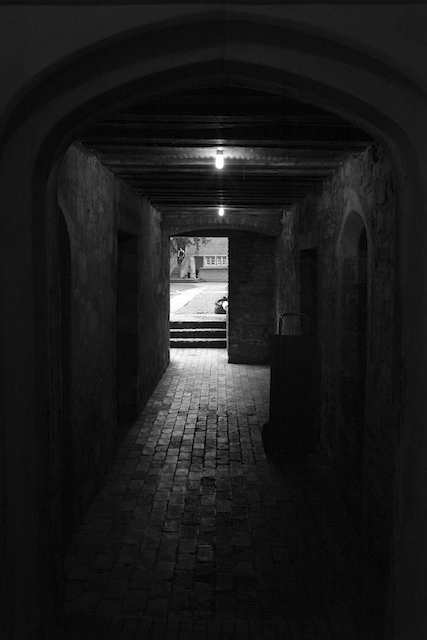Very little is known of Roger Andrewes, not least because he stood constantly in the shadow of his far more influential brother, Lancelot Andrewes. His date of birth is unknown, and no details are readily accessible concerning his early education and upbringing.
Doorway - Jesus College, Cambridge
flickr.com
Obvious nepotism?
Roger's brother Lancelot was Master of Pembroke College, when Roger was made a fellow there, perhaps through Lancelot's influence. When Lancelot was bishop of Chichester, Roger was a prebendery, an archdeacon and chancellor of Chichester cathedral. When Lancelot went on to Ely cathedral in 1609, Roger also received a prebend there. It was no accident that Roger Andrewes became Master of Jesus College, Cambridge, as this post was in the gift of the Bishop of Ely! By this time Roger was a fellow of Pembroke Hall, which independently shows he had genuine scholarship. However, a clear pattern emerges through his adult life, which causes Nicolson says Roger Andrewes was widely loathed by his contemporaries - which, if true, shows a deep jealousy or envy at work, in the face of nepotism.
flickr.com
Work as a translator
The first Cambridge group was responsible for translating the Old Testament books, Chronicles to Ecclesiastes. Members of this group were Roger Andrewes (or Andrews), Master of Jesus College, Cambridge; Andrew Byng, and Laurence Chaderton, one of the original delegates at Hampton Court. Also members were Francis Dillingham, prolific as a writer; Thomas Harrison, whose scholarship approached that of Lancelot Andrewes; Edward Lively, a Hebraist; Robert Spalding, and John Richardson. Being in the same group as his brother Lancelot, Roger was surely Lancelot's choice. But, that is not to say he did not have, at the very least, the expertise required to fulfil the appointed task. Having said that, we may wonder what caused Lancelot Andrewes to remark his group was largely neglecting their commission in the earlier years of the translation process.Roger Andrewes died in 1630.
Nicolson, Adam. (2003) Power and glory: Jacobean England and the making of the King James Bible, Lon: Harper.
This is 30/52 previous next /a> index

No comments:
Post a Comment